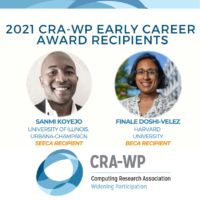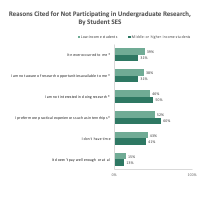Expanding the Pipeline: CRA-WP Holds Virtual Grad Cohort Workshop for Women
On April 23-24, CRA-WP was thrilled to hold the 2021 Grad Cohort Workshop for Women after canceling the previous year’s event because of the COVID-19 pandemic. Grad Cohort for Women 2021 was quite different than previous Grad Cohorts as it was held virtually using the Socio event platform. The workshop still consisted of advice panels by professors and research scientists, research discussion sessions, a keynote talk, one-on-one mentoring sessions, an exhibit hall, and even food breaks complete with a customized snack box delivered in advance. Attendance was strong with 375 students, 35 speakers and mentors, 36 sponsors and 14 staff present.
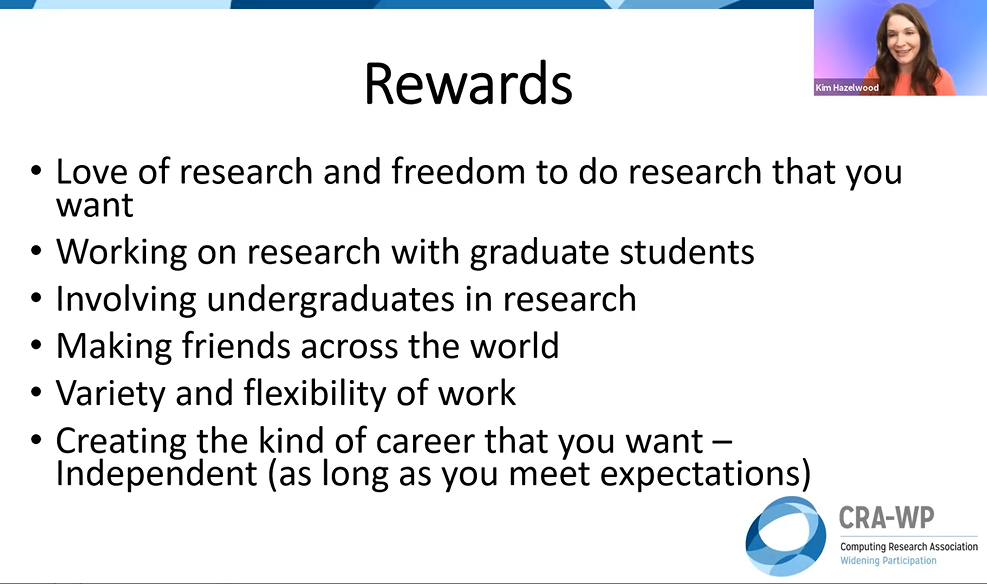
Kim Hazelwood in the panel on “Academic Career Paths and Job Search”
Grad Cohort for Women is designed with three parallel tracks for graduate students in their first three years, with each track consisting of panels on advice appropriate for the year. Using Socio, we held several virtual panels, some pre-recorded and some live, and all sessions featured live Q&A. For first-year graduate students, there were panels on networking, finding and developing a relationship with an advisor, summer internships, and presentation and communication skills. For second-year graduate students, there were panels on the research mindset, finding a research topic, building your self-confidence, and publishing your research. For third-year graduate students, there were panels on preparing your thesis proposal, industry versus academic research positions, PhD career paths and job search, and entrepreneurship.
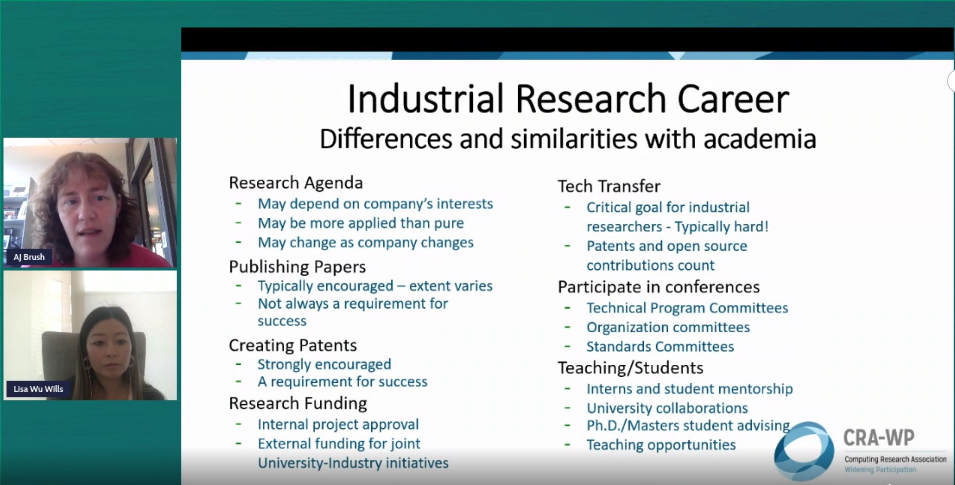
AJ Brush and Lisa Wu Wills during the panel on “Industry Vs. Academic Research Positions”
Several sessions brought all the students together. For example, there were panel discussions on strategies for human-human interaction, and balancing graduate school and personal life. Margo Seltzer (University of British Columbia) presented the keynote session, during which she talked about how life is like a three-legged stool, with the three legs representing the aspects of research, school and personal life. The legs may change what they represent and change their length and significance as you move through life, making the stool wobbly in different ways.
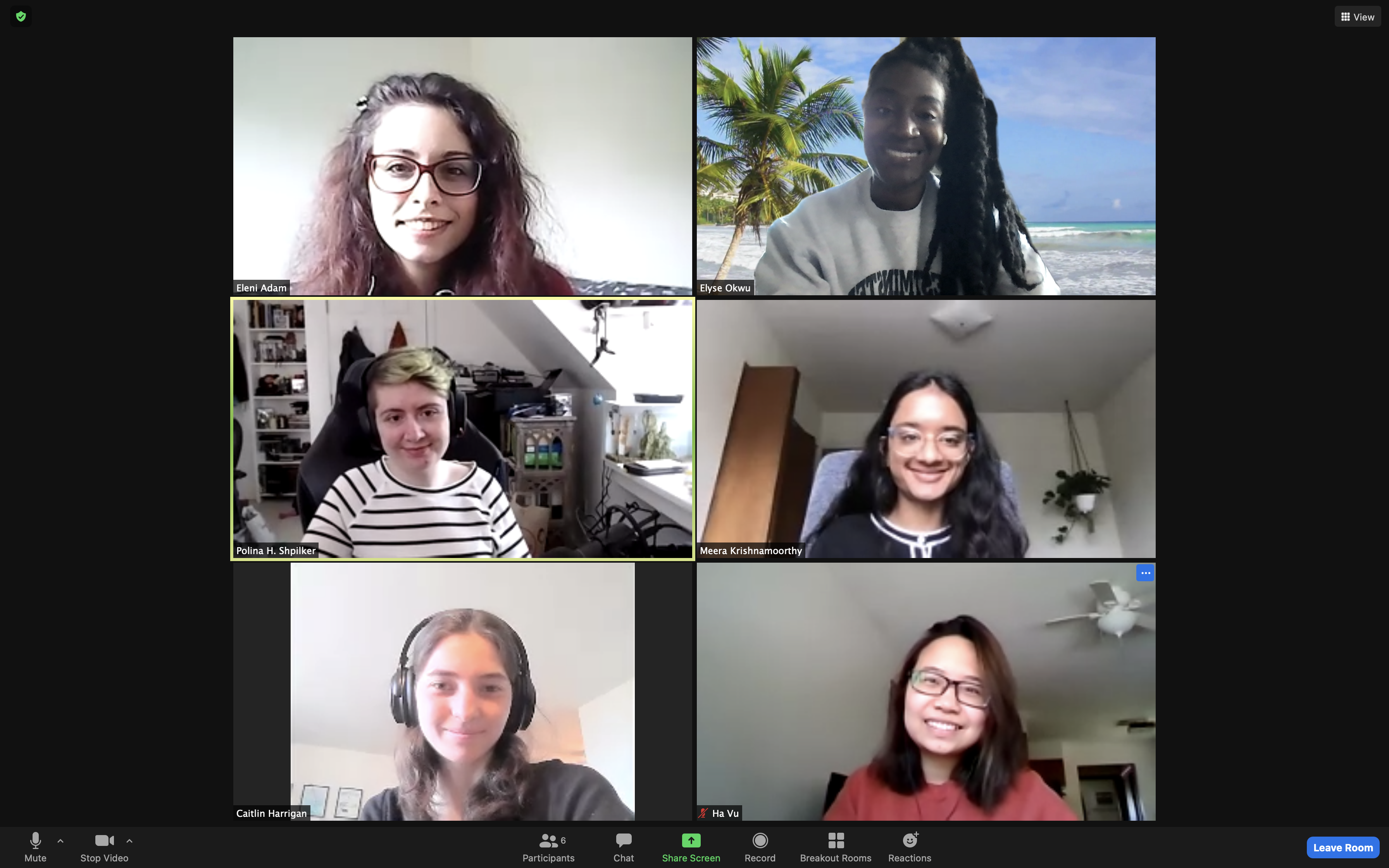
A tech talk group on Health
Grad Cohort typically has a large poster session with mostly third-year graduate students presenting their research, and people wandering through the poster room. This year, we still wanted to create some type of personal interaction with students presenting their research. Instead of a virtual poster session which had many limitations, we decided to hold small group tech talks. We asked students who wanted to present their research to prepare a one page flyer and a five minute talk about their work. Using their research areas, they were divided into 31 groups of 4-5 students with a moderator. Other students not presenting could join the tech talk group, which had a limit of ten people total. This small group size gave everyone a chance to introduce themselves and meet other students in their research area. Then the students described their research work and answered questions.
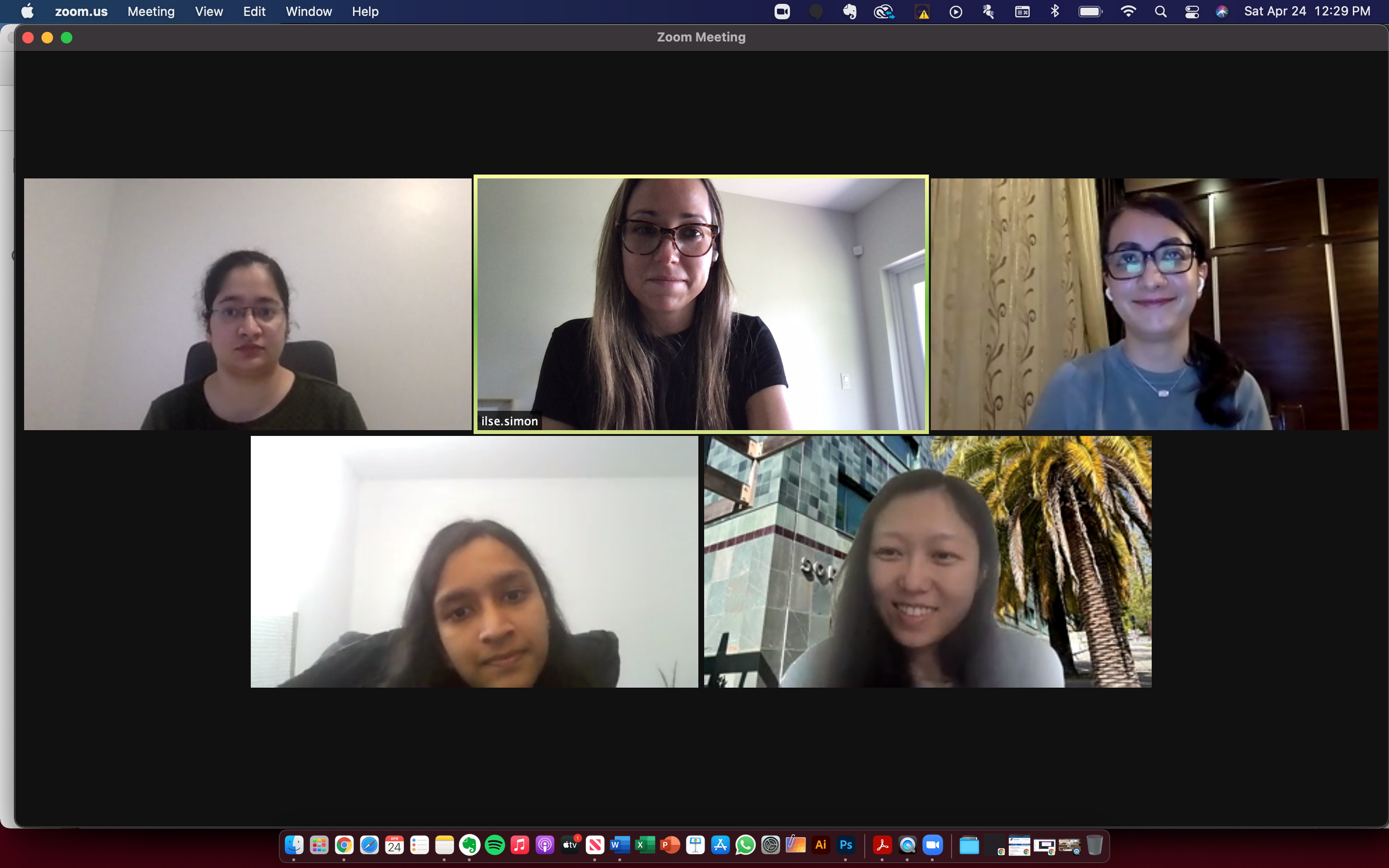
A tech talk group on Network Architecture/OS
The participants were also able to engage with mentors and sponsor representatives. During one-on-one mentoring students had a chance to talk about issues or have their CV reviewed by a mentor. Students provided preferences from a list of mentors and were matched to several mentors for Zoom meeting appointments. Because this was held virtually, we were able to include additional mentors who were not speakers. During the workshop, there were open hours when students could enter the virtual exhibit hall and join a sponsor video room to talk with sponsor representatives. This gave students a chance to meet face-to-face with booth representatives and recruiters.
The CRA Center for Evaluating the Research Pipeline (CERP) provided evaluation of the event. CERP received feedback from 59% of attendees (222 of 375) on the workshop logistics, the Socio platform, and many other aspects of the workshop such as the opportunities for mentorship. Results indicated that overall, attendees were satisfied with many aspects of the workshop, with the special treat for attendees (snack box) being a clear winner with 98% of attendees expressing some level of satisfaction. Regarding Socio, 79% of respondents expressed satisfaction with the platform for the workshop. For the one-on-one mentoring, 92% of those who participated indicated they found the mentoring moderately or extremely useful for their professional development; this finding was true for both the first and second day mentoring opportunities. Further, 83% found the tech talks moderately or extremely useful for their professional development, with 93% indicating they were able to network with other attendees during the tech talks at least a little bit. Finally, CERP found that 34% of the attendees were able to connect with at least one sponsor during the workshop, with nearly 80% of respondents finding that time moderately or extremely useful. Taken together, these results from CERP suggest that the necessary changes Grad Cohort made to transition into a virtual format were successful overall.
We appreciate and thank all our sponsors for their contributions. Grad Cohort for Women would not be possible without their support.
Platinum
ACM, CRA, NSF, US Department of Energy
Gold
Facebook, Microsoft, NSA, Private Foundation
Silver
Access Computing, Dataminr, Google, Intel, SIGARCH ACM, SIGCHI ACM, SIGCOMM ACM, SIGGRAPH ACM, SIGHPC ACM, SIGIR ACM, SIGKDD ACM, SIGOPS ACM, SIGPLAN ACM, SIGSOFT ACM, WICARCH
Bronze
AnitaB.org, Bloomberg, D.E. Shaw Research, IEEE-CS TCCA, Raytheon BBN Technologies, SIGACT ACM, SIGCSE ACM, SIGMICRO ACM, SIGMOBILE ACM, SRC
Supporter
Oak Ridge National Lab
The Grad Cohort Workshops are supported in part by the Department of Energy (DE-SC0021328) and the National Science Foundation (CNS-1840724). Any opinions, findings, conclusions or recommendations expressed are those of the author(s)/presenter(s) and do not necessarily reflect the views of the Department of Energy or the National Science Foundation.








